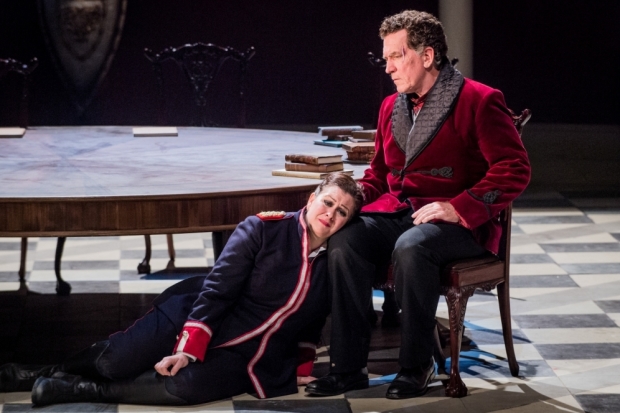Review: Die Walküre (West Horsley Place)
Grange Park Opera triumphs in the second part of Wagner’s Ring cycle

© Robert Workman
High-end, high-res and high-concept, Stephen Medcalf's new production for Grange Park Opera is an eye-opener. The manor house at West Horsley may be dilapidated, its fields overgrown and its opera house unfinished, but Jamie Vartan's sleek, solid designs for Wagner's Die Walküre (and by inference probably for a full Ring cycle) are mightily impressive.
Medcalf's pitch, evidently, was 'Night at the Museum: Valhalla'. In confident brush strokes he sets the opera within galleried rooms filled with glowing artwork and display cabinets, and under David Plater's subtly institutional lighting it all works remarkably well. The director only blows it once, when deciding to place Siegmund's magic sword, Nothung, in a trophy frame rather than buried in the tree trunk that stands below it. That makes a distracting nonsense of the libretto's precise arboreal references, and unnecessarily so.
When performing Der Ring des Nibelungen in a mid-sized house like the Theatre in the Woods, some level of conceptualisation is essential. Eight Valkyries on horseback would look pretty silly charging in through the stage door, after all. And Medcalf turns limitations to his advantage with a raft of telling touches: for example, when Fricka (Sara Fulgoni, very intense) bickers with a downtrodden Wotan, the domestic chink of their teacups traduces the gods far more effectively than any celestial hubris.
Die Walküre begins on earth as Siegmund and Sieglinde, Wotan's wrong-side-of-the-bed twin children, meet and fall in love. Bryan Register and Claire Rutter sang the pair with rare passion and a full command of Wagner's imposing vocal lines, with only Siegmund's love song lacking the last degree of sweetness. Unfortunately, the normally even-toned Alan Ewing as Sieglinde's husband Hunding, cuckolded and murderous, sounded a little hollow at the second performance.
'A rewardingly fiery coup de théâtre''
Up in Valhalla (or maybe just the next gallery along), Thomas Hall sang the hell out of Wotan. A prodigious role needs a singer to match, and Hall delivered the performance of the evening. His voice sat particularly well in the modest-sized space – although it might have underwhelmed in a larger house – and he gave a considered interpretation of Wotan's dilemmas. He was, though, the victim of Medcalf's achilles heel: a fumbling way with stage relationships. The lengthy exchanges between the uber-god and his disobedient daughter, Brünnhilde, were desperately under-directed, to the extent that at one point, and for no discernible reason, Hall went for a stroll round the stage's perimeter while Jane Dutton sang at him.
Given that Dutton is a former mezzo who's risen up the scale to become a dramatic soprano, there was a disappointing lack of chest resonance to her voice. She grew shrill at volume, and her exchanges with the eight Valkyries had the piercing shriek of schoolgirls on a bus. But she is a fine stage actress and her thoughtful incarnation of a junior god had, ironically, a fierce humanity.
Under Stephen Barlow's sonically balanced and dramatically sensitive baton, the Bournemouth Symphony Orchestra gave an iridescent account of the score. Whether unpacking the textural subtleties in wordy exchanges among the gods or riding the wind with the Valkyries, they made a thrillingly authentic Wagner sound. It was a treat to hear this accomplished band strut their stuff so close to London.
The evening ends on a rewardingly fiery coup de théâtre; and, as a coda, both Sieglinde and (we must assume) Grimhilde, the latter casually raped by the evil dwarf Alberich, share a pointed antenatal moment: the one pregnant with the hero Siegfried, the other with the villainous Hagen. At that moment – and hats off to Medcalf for getting me there – I longed to binge on the whole box set. 'Previously on The Ring…'
There are further performances of Die Walküre at West Horsley Place on 5, 9, 12 and 15 July.












